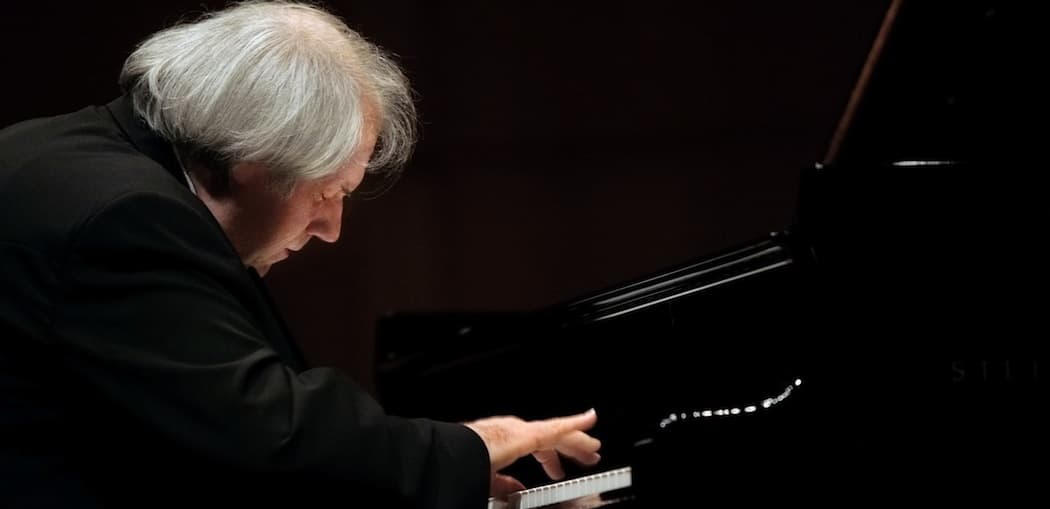Advertisement
Does Grigory Sokolov, 'The Greatest Living Pianist,' Speak To A Higher Power?

You look at Grigory Sokolov and you say, “Just what the world needs. Another aging white guy in formal attire playing music of the 19th century.” And then you listen to the first few notes of Schubert’s “Impromptus” and you say, “Yes, this is exactly what the world needs now.” Forget the ironic contemporary spin on the word, this new DVD is truly awesome, as are his two latest CDs, also on Deutsche Grammophon.
The greatest living pianist? The list of those who say so is growing. I got turned onto Sokolov when Jeremy Eichler, writing in The Boston Globe, chose his first Yellow Label recording as the best in 2015:
“The revered and reclusive Russian master Sokolov had sworn off recording for years. Happily he has relented, and now comes this mysteriously spellbinding disc from a Salzburg recital in 2008. Why is he often described as the greatest living pianist? The answer begins here.”
That disc, his first since 1995, featured Mozart and Chopin. Now comes a second disc on both CD and DVD focusing on Schubert and Beethoven’s “Hammerklavier” piano sonata. The playing is every bit as uncanny and magisterial.
Sokolov, who was born in St. Petersburg in 1950, hasn’t played in the United States in years, which is partly why he hasn’t been hyped to the heavens here. But even if he were, the image makers would have a task ahead of them. Unlike Yuja Wang (whom I love) or Lang Lang (not so much), the only flamboyant thing about him is his utter lack of flamboyance.
He walks out onto the Berlin Philharmonic stage in the new DVD, shot in 2013, like a cross between The Penguin and Friar Tuck. Stocky, affect-less, a long white mane framing a bald pate and dressed in overflowing formal wear that looks as if it’s borrowed from a taller friend, he almost looks like a caricature of a classical pianist. A short, stiff bow to the audience only enhances the effect. He sits at the piano, staring at it as if he’s about to plunge into a freezing body of water.
But he’s plunging into a different world altogether, eyes closed, mouth fluttering. Much is made by Oswald Beaujean’s liner notes about the despair that Sokolov is drawing out of Schubert’s music: “Listeners who abandon themselves unreservedly to … Sokolov’s interpretation of [Schubert’s music] will have the uncomfortable feeling that their very existence is threatened.”
Whoa!
I had quite the opposite reaction. Sokolov to me is channeling something far more life-affirming. Out of the depths of Schubert’s sorrowful final years comes music that is so rapturous, so transcendent that one can only marvel at the world beyond words and beyond interpretation that Sokolov finds in Schubert.
Spellbinding is another of those words that is used too loosely, but it’s one that fits Sokolov’s playing better than any musician I can think of. It's applicable for both the audience, and for Sokolov himself. With his eyes closed, his body hunched over, his distaste for any extraneous movement evident, he’s in a zone where nothing but the music seems to be able to enter in or flow out of his body. Director Bruno Monsaingeon is Sokolov’s soulmate, never being showy for the sake of it, but rather going with the flow of Sokolov’s music-making, capturing both the intimacy and grand scale of the occasion.
According to James Rhodes in the Guardian, Sokolov is “obsessed with the occult.” He looks to be more in pain than in ecstasy but given the music that emerges, perhaps that’s the price he has to pay.
Rhodes also wrote:
“Grisha Sokolov is the greatest living pianist in the world — that’s a bold claim, I know, but he manages to do things with a piano that should be categorised under ‘not humanly possible’. In a career spanning over 35 years (he won the Tchaikovsky Competition, the greatest accolade an aspiring pianist can achieve, at the unheard of age of 16) he has released only six or seven recordings — all live, and not ‘live’ as in ‘I’ve cobbled together the best bits of a series of concerts and rehearsals’, but the real deal: one take, one concert, one huge gamble.”
But that was before these two amazing discs and DVD from DG. The 21-minute adagio from the “Hammerklavier” could almost make an avowed atheist believe there’s a God. And with his monkish appearance, his technical mastery and the ability to convey Beethoven’s genius on an epic (but not heroic) scale, he indeed gives the impression of being in direct communication with a higher power.
The Berlin Philharmonie becomes a cathedral and sanctuary in his hands. And however you parse Sokolov’s genius, what more could you ask of a musician than to create such a sense of exaltation? Would that Symphony Hall someday becomes such a sanctified place with Sokolov at his Steinway.
Ed Siegel is critic at large and editor of The ARTery.



